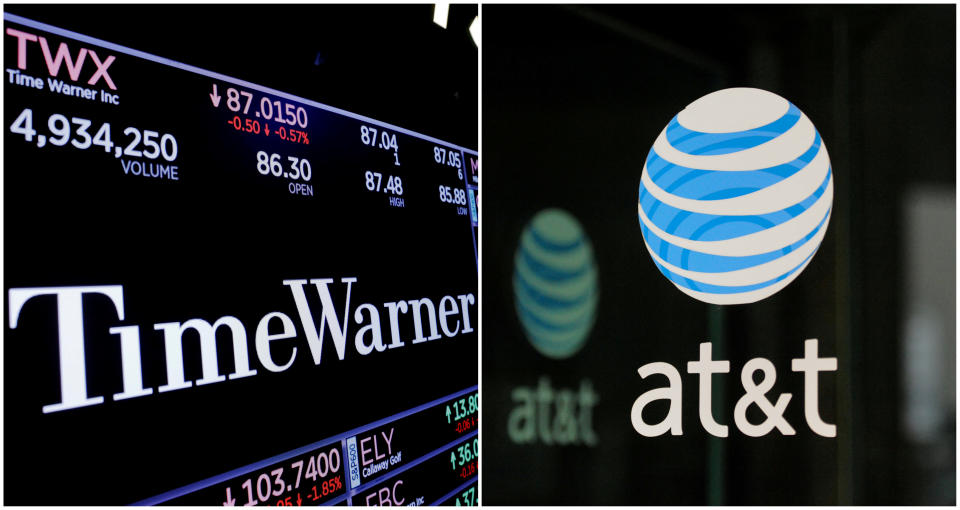Judge approves AT&T-Time Warner merger
A federal judge on Tuesday approved AT&T’s (T) $85 billion acquisition of Time Warner (TWX), in a case that has captivated deal-watchers because it involves a vertical merger, a type of deal that rarely faces challenges from antitrust regulators.
Time Warner’s stock was up roughly 5% to around $101 in after-hours trading, and AT&T’s stock was down 2% to $33.
The judge, Richard Leon, did not attach any conditions to his approval, in a blow to the Justice Department, which challenged the deal.
Another telecom giant, Comcast (CMSA), likely watched the AT&T case closely and will reportedly make a bid for Twenty-First Century Fox now that Judge Leon has blessed the Time Warner mega-deal.
But companies outside the media landscape were likely also eagerly awaiting Leon’s ruling, including CVS (CVS) Health Corp., which is trying to buy a company it doesn’t compete directly with, the health insurer Aetna (AET).

“If the deal goes through, it’s going to be a real green light for a lot of vertical mergers in a lot of different sectors,” Emilie Feldman, an associate professor of management at Wharton of the University of Pennsylvania, told Yahoo Finance, before Leon issued his opinion.
She noted that, in recent years, companies have sought mergers as a way to stay competitive as various industries like health care face consolidation and increased competition from new technologies.
Reuters notes that Time Warner has been the target of three of the top 10 tech/media/telecom deals of all time, including the AT&T deal. In 2000, America Online acquired Time Warner in a $181 billion deal. In 2014, 21st Century Fox attempted to buy Time Warner in a $95 billion deal — but that deal was withdrawn.
Several outcomes scenarios were possible
In its complaint, the U.S. government contended that AT&T, which owns DirecTV, would gain the ability to force its rivals to pay “hundreds of millions of dollars more per year for Time Warner’s networks” if the deal went through. This leverage would cost American consumers money and leave them with fewer entertainment choices, according to the government.
Judge Leon ruled in a 172-page opinion that the government failed to establish that the deal was likely to “lesson competition substantially.” In an email message, Cornell Law antitrust professor George Hay said the opinion was “not a radical one” and would be tough to overturn on appeal.
“In ruling that the merger could go forward, the judge did not take the approach favored by some that a vertical transaction like this could never pose a competitive problem,” Hay said. “Rather he took the straightforward position that the evidence did not support the assumptions on which the DOJ theory of competitive harm depended.”
He added: “The opinion does not take the DOJ completely out of the merger business, but simply admonishes them to make sure the facts support their theory. Of course, the DOJ can seek to prevent the merger from going forward pending appeal, though the judge discouraged them from doing so. Even if the merger is consummated, the DOJ can appeal the decision but it is uncertain whether they will.”
There were several possible outcomes in this case aside from an outright approval without conditions: Leon could have rejected the deal outright. Judge Leon could have also approved the deal and attached conditions to it, for example requiring that AT&T and Time Warner divest assets or take measures to ensure it doesn’t overcharge AT&T’s competitors for Time Warner content like HBO.
AT&T applauded the judge’s decision to approve the deal without any concessions. “We are pleased that, after conducting a full and fair trial on the merits, the Court has categorically rejected the government’s lawsuit to block our merger with Time Warner,” AT&T’s general counsel, David McAtee, said.
The Justice Department said it was weighing its options after the defeat. “We continue to believe that the pay-TV market will be less competitive and less innovative as a result of the proposed merger between AT&T and Time Warner,” said Assistant Attorney General Makan Delrahim, who’s in charge of the Antitrust Division. “We will closely review the Court’s opinion and consider next steps in light of our commitment to preserving competition for the benefit of American consumers.”
Erin Fuchs is deputy managing editor at Yahoo Finance.
See also:
Why the Time Warner deal could be ‘uniquely significant’ for AT&T’s CEO
